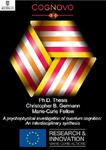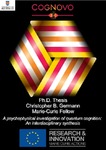A psychophysical investigation of quantum cognition: An interdisciplinary synthesis
| dc.contributor.supervisor | Harris, Christopher, M | |
| dc.contributor.author | Germann, Christopher, B | |
| dc.contributor.other | Faculty of Health | en_US |
| dc.date.accessioned | 2019-04-15T12:38:03Z | |
| dc.date.issued | 2019 | |
| dc.identifier | 10263161 | en_US |
| dc.identifier.uri | http://hdl.handle.net/10026.1/13713 | |
| dc.description | Edited version embargoed until 15.04.2020 Full version: Access restricted permanently due to 3rd party copyright restrictions. Restriction set on 15/04/2019 by AS, Doctoral College | |
| dc.description.abstract |
Quantum cognition is an interdisciplinary emerging field within the cognitive sciences which applies various axioms of quantum mechanics to cognitive processes. This thesis reports the results of several empirical investigations which focus on the applicability of quantum cognition to psychophysical perceptual processes. Specifically, we experimentally tested several a priori hypotheses concerning 1) constructive measurement effects in sequential perceptual judgments and 2) noncommutativity in the measurement of psychophysical observables. In order to establish the generalisability of our findings, we evaluated our prediction across different sensory modalities (i.e., visual versus auditory perception) and in cross-cultural populations (United Kingdom and India). Given the well-documented acute “statistical crisis” in science (Loken & Gelman, 2017a) and the various paralogisms associated with Fisherian/Neyman-Pearsonian null hypothesis significance testing, we contrasted various alternative statistical approaches which are based on complementary inferential frameworks (i.e., classical null hypothesis significance testing, nonparametric bootstrapping, model comparison based on Bayes Factors analysis, Bayesian bootstrapping, and Bayesian parameter estimation via Markov chain Monte Carlo simulations). This multimethod approach enabled us to analytically cross-validate our experimental results, thereby increasing the robustness and reliability of our inferential conclusions. The findings are discussed in an interdisciplinary context which synthesises knowledge from several prima facie separate disciplines (i.e., psychology, quantum physics, neuroscience, and philosophy). We propose a radical reconceptualization of various epistemological and ontological assumptions which are ubiquitously taken for granted (e.g., naïve and local realism/cognitive determinism). Our conclusions are motivated by recent cutting-edge findings in experimental quantum physics which are incompatible with the materialistic/deterministic metaphysical Weltanschauung internalised by the majority of scientists. Consequently, we argue that scientists need to update their nonevidence-based implicit beliefs in the light of this epistemologically challenging empirical evidence. | en_US |
| dc.language.iso | en | |
| dc.publisher | University of Plymouth | |
| dc.subject | Psychology | en_US |
| dc.subject | Neuroscience | en_US |
| dc.subject | Psychophysics | en_US |
| dc.subject | Quantum Physics | en_US |
| dc.subject | Cognitive Science | en_US |
| dc.subject | Perception | en_US |
| dc.subject | Decision-making | en_US |
| dc.subject | Noncommutativity | en_US |
| dc.subject | Epistemology | en_US |
| dc.subject | Nonduality | en_US |
| dc.subject.classification | PhD | en_US |
| dc.title | A psychophysical investigation of quantum cognition: An interdisciplinary synthesis | en_US |
| dc.type | Thesis | |
| plymouth.version | non-publishable | en_US |
| dc.identifier.doi | http://dx.doi.org/10.24382/1100 | |
| dc.rights.embargodate | 2020-04-15T12:38:03Z | |
| dc.rights.embargodate | 9999-09-09 | |
| dc.rights.embargoperiod | 12 months | en_US |
| dc.type.qualification | Doctorate | en_US |
| rioxxterms.funder | Seventh Framework Programme | en_US |
| rioxxterms.identifier.project | Marie Curie Initial Training Network FP7-PEOPLE-2013-ITN, CogNovo, grant number: 604764 | en_US |
| rioxxterms.version | NA | |
| plymouth.orcid.id | 0000-0002-1573-4651 | en_US |
Files in this item
This item appears in the following Collection(s)
-
01 Research Theses Main Collection
Research Theses Main



